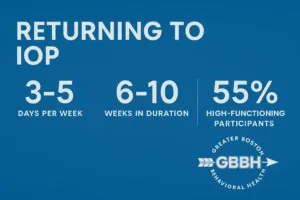You didn’t plan to stop going. Maybe you told yourself it was just a week off. Maybe you ghosted after a hard group session. Maybe life outside treatment got loud—too many demands, not enough energy. Or maybe you just felt yourself slipping out of it quietly, unsure how to get back in.
And now, some time has passed.
You think about reaching out again—but shame shows up. So does doubt. You might wonder, Is it too late? Will they take me seriously? Am I allowed to start again?
At Greater Boston Behavioral Health, we want you to know this: you are still welcome.
This is your space to breathe. To return without punishment. To restart, not rewind. Here’s how to break the dropout loop and come back to care—one honest step at a time.
1. Leaving Mid-Treatment Is More Common Than You Think
Most people think dropping out means they “failed.” But from where we sit? It just means you’re human.
The truth is: treatment doesn’t always unfold in a straight line. People pause. People ghost. People try to manage on their own. That doesn’t make you broken. It means your life is complex—and your healing needs might have shifted.
Some clients leave IOP because:
- A family emergency took priority
- Group dynamics felt intimidating
- The timing no longer worked with work or caregiving
- They started feeling better and thought they were “done”
- They hit something emotional and pulled away
Whatever your reason, it matters. And it doesn’t cancel out your progress or your right to re-enter.
2. Recognize the Loop: Pause → Shame → Silence
Dropout rarely starts with a decision. More often, it starts with a missed session.
You miss one day, then two. You tell yourself you’ll reach out. But days turn into weeks, and then something else settles in: shame.
You might think:
- “I blew it.”
- “They probably gave up on me.”
- “It’s too embarrassing to go back now.”
That shame creates silence. And silence extends the distance between you and the help you still deserve.
But here’s a truth we hold close: you don’t have to be perfect to keep going. You just have to come back.
3. You’re Not Starting Over—You’re Picking Up the Thread
Coming back to IOP doesn’t mean starting from scratch. It means picking up the thread of your healing from a new place—with more experience, more insight, and more self-awareness.
We don’t treat you like a beginner. We treat you like someone brave enough to return.
And yes, your treatment plan might shift. You might work with a new group, a different schedule, or a new clinician. But your past work isn’t erased—it’s part of what brought you here today.
4. We Won’t Make You Explain Yourself
We know making the first call or walking through the door again can feel overwhelming. That’s why we lead with care—not questions.
We won’t say, “Where did you go?”
We’ll say, “We’re glad you’re here.”
You don’t have to justify your absence. You don’t have to confess. You don’t have to perform readiness. Just come as you are.
Whether you’re in Boston or nearby areas like Waltham or Wellesley, we’ll meet you where you are—no shame, no judgment, no reset button.
5. This Time, It Can Be Different
If something about the last round of IOP didn’t work for you, let’s talk about it.
Maybe the structure was too rigid. Maybe the group wasn’t the right fit. Maybe the commute was draining. Whatever got in the way, it matters—and we want to adjust.
Here’s what “coming back” might include:
- A schedule that actually works for your life
- Starting with individual therapy to re-acclimate
- Access to different group leaders or focus areas
- More support for transitions (like returning to work, parenting, or school)
This time can feel safer. More doable. More real. And we’ll make sure of that—together.
6. Trying Again Isn’t Weakness. It’s Proof of Hope.
It’s easy to believe the lie that if you “really wanted it,” you would’ve stayed the first time. But healing doesn’t work that way.
Trying again takes courage most people never see. It’s proof that even after slipping, doubting, or hiding—you still believe there’s something better waiting.
You don’t need confidence to return. You don’t need certainty. Just a little bit of willingness to see what happens when you say yes again.
And if all you can do is make the call? That’s enough.
7. Take the First Step—Even If You’re Unsure
You don’t need to know how the whole path looks.
If you’re feeling hesitant, scared, or just tired—that’s okay. You don’t need to be ready forever. You just need to be ready right now.
Here’s what your next step could look like:
- Texting or calling us with a simple “Can we talk?”
- Asking for a check-in instead of jumping into full sessions
- Scheduling a low-pressure re-assessment
- Talking to someone you trust about what you need
The first step doesn’t have to be confident. It just has to be real.
Frequently Asked Questions: Coming Back After Dropping Out of IOP
Can I return even if I ghosted mid-treatment?
Yes. You don’t need to explain why you left. We’re more interested in how you’re doing now and how we can support you moving forward.
Will I be placed in the same group as before?
Not necessarily. If you want to join a different group or need a change, we’ll make that adjustment based on your current needs.
What if I left because I didn’t feel ready?
That’s okay. Readiness is not a fixed thing. Many clients return when the timing feels more right—and we respect that.
Do I need a new assessment to come back?
Usually, yes. It helps us understand where you are now and how best to support you. But it’s not a test—it’s a conversation.
Will insurance still cover it?
In most cases, yes. Our team can verify your benefits and help you navigate coverage before you restart care.
What if I’m worried I’ll leave again?
We can talk about that. We’re here to support consistency, but also flexibility. We’ll help build a plan that supports your goals—and your reality.
Can I return to IOP if I live outside Boston?
Yes. We serve clients from surrounding communities like Needham and beyond. Our team can help coordinate care that works for your schedule and location.
You Haven’t Missed Your Chance
You didn’t blow it. You didn’t ruin anything. You took a pause—and now, you’re thinking about coming back.
That’s recovery.
Call (888) 450-3097 or visit Greater Boston Behavioral Health’s Intensive Outpatient Program to learn more about services in Boston, Massachusetts. When you’re ready, we’re still here—and we always will be.


